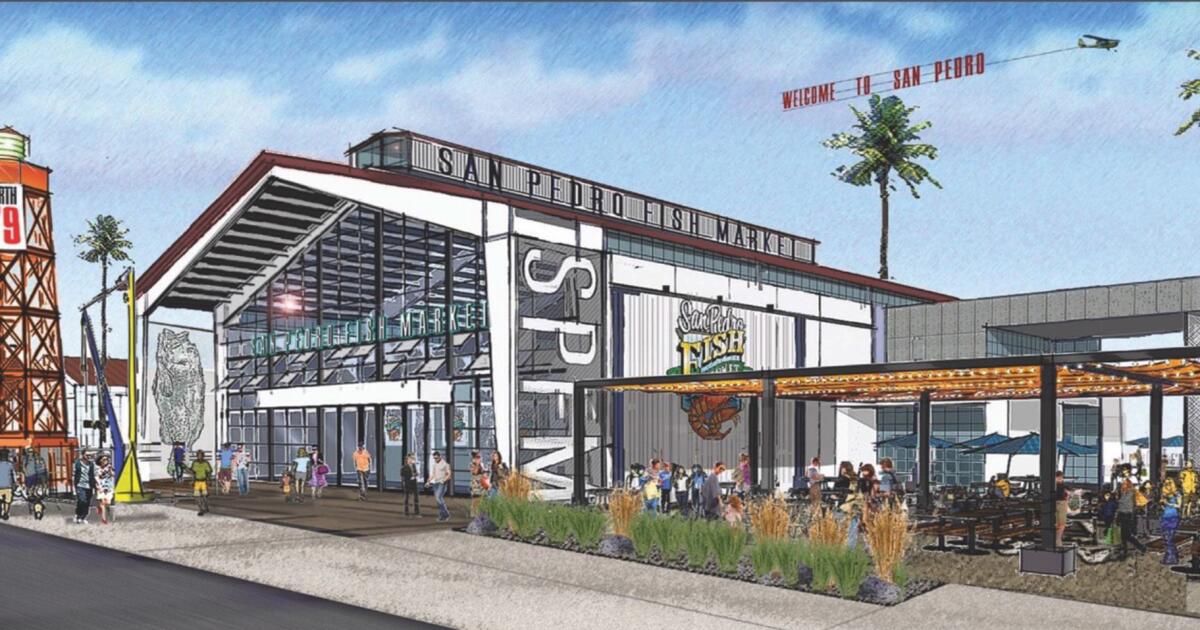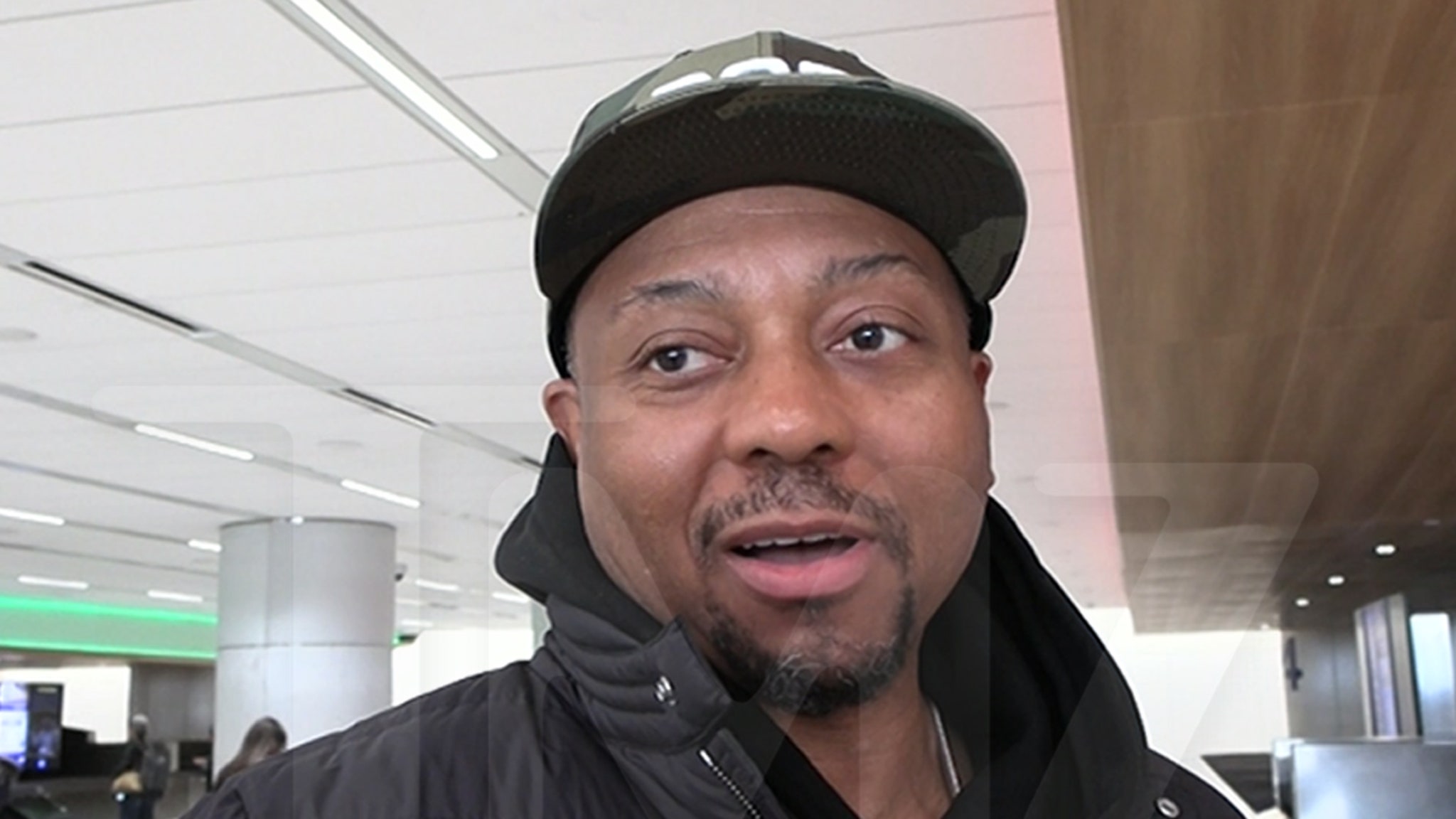World
In Brazil, the EU’s deforestation law has many skeptics
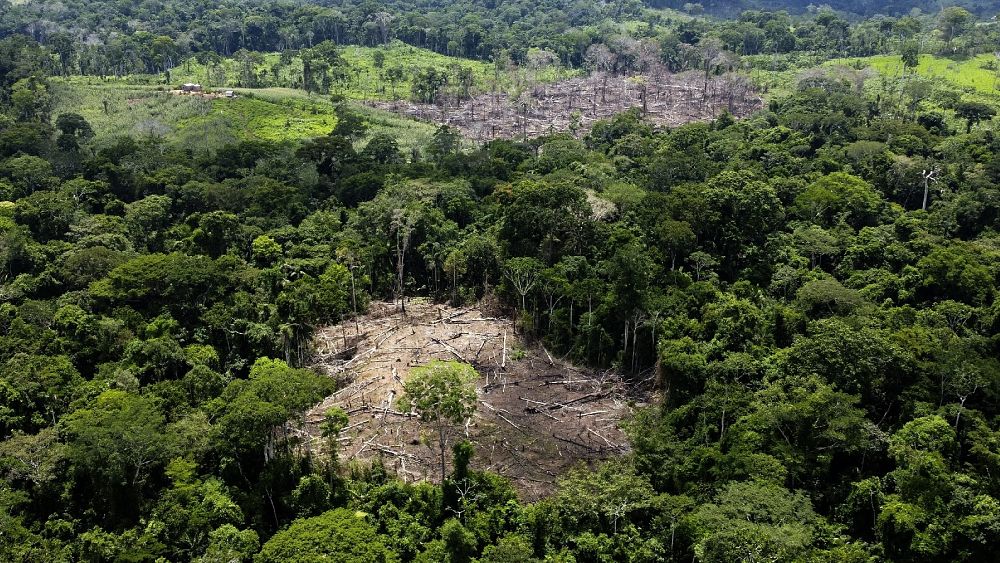
The new EU law to ban imports of products that drive deforestation has been cheered by people across the continent but on the other side of the Atlantic, fears are growing it will disproportionately impact small farmers and lead to deforestation in less protected areas.
The EU deforestation law, which secured its final green light in May, will require producers of cattle, cocoa, coffee, palm oil, soy, rubber and wood to provide proof that their supply chain is entirely free of deforestation.
Getting to know where the products we consume come from, and making sure that their entire supply chain is free from deforestation, is currently a top priority for many consumers. According to a survey conducted by Globescan in 2022, 78% of Europeans believe that governments should ban products that drive deforestation.
But fears are that the new technological requirements for exportation will place an additional financial burden on small-scale producers, which are often more sustainable than larger farmers, to demonstrate their environmental standards. In the end, it might be easier for them to just stop exporting their production to Europe at all.
“The legislation is very good to prevent European countries from consuming products associated with deforestation, but not necessarily in reducing deforestation itself. It’s more about getting rid of the problem than solving it,” Olivia Zerbini Benin, a researcher at the Brazilian non-profit IPAM, told Euronews.
GPS coordinates and satellite photos
To export to Europe, Brazilian farmers will need to upload traceability data including GPS coordinates, which will be mapped against satellite photos of farms and forests, among other documents.
Inspections will be conducted according to the level of risk attributed to each country: for those deemed high-risk, up to 9% of the exports will be checked. Even though the regulation was approved in May, companies have until December 2024 to adjust to the new rules, and a lot of details about how the enforcement will take place are still to be determined.
The European bloc is Brazil’s second-biggest trading partner, and the Latin American country is the single biggest exporter of agricultural products to the EU, so it’s no surprise that its agriculture minister, Carlos Favaro, heavily criticised the new European deforestation law right after its approval, calling it “an affront” to international trading.
But, according to farmers and experts, the impact of the rule is not just political. They argue that there is a risk of social impact if the law imposes barriers that only large-scale farmers can adapt to.
“How are you going to demand this level of traceability if you don’t provide conditions for production to be regularised? Farmers need technical support for both identifying the bottlenecks and for regularising their supply chain. They need a kind of assistance that doesn’t exist today, and small-scale farms will certainly be the most affected,” said Caio Penido, producer and president of Instituto Mato-grossense da Carne (Imac), which represents cattle farmers from Mato Grosso, the largest beef-producing state in the country.
Even among Brazilian environmentalists the new deforestation law is under scrutiny. Olívia Benin, who is part of a scientific non-profit that works with public policies to protect Brazilian ecosystems, believes that the new guidelines are a step in the right direction, but should have been built collectively with the countries most affected.
An expert on international trade and sustainable development in the Amazon, with emphasis on the Brazil-European Union relationship, Benin argues that even though the new legislation has good intentions, its ability to reduce tree loss in Brazil is limited.
“It’s great to see countries start to question what they consume and where it comes from, but the effects in Brazil are narrow because much of the deforestation happens in areas that are not covered by the new law,” the researcher said.
Deforestation leakage
A big point of criticism for Brazilian environmentalists is that the legislation only covers the areas of the country that are already under protection. This could lead to what is called deforestation leakage, which happens when less protected ecosystems are targeted for deforestation instead.
“At the end of the day, when you look at Brazil as a whole, what change will this legislation bring in terms of deforestation? Because many areas that are very much in danger were not covered, even in the Amazon forest,” Olivia Benin said.
Around 84% of the Amazon forest is protected by the new EU law, according to a technical note released by MapBiomas, an initiative to monitor land use in Brazil developed by a network of universities, NGOs, and technology companies. But, in other ecosystems, the percentage of protection is much lower.
The FAO definition that is being used by the EU regulations covers a large proportion of only three out of seven biomes mapped in South America. In addition to a high percentage of the Amazon, it also protects a large part of the Chaco (75%), an ecosystem present in Argentina and Paraguay, and the Atlantic Forest (71%), which exists in Brazil, but covers a much smaller part of the country.
The MapBiomas report warns that in other ecosystems spanning large areas of Brazil, such as the Caatinga, the Pampa, the Pantanal and the Cerrado, only 10% to 26% of the remaining vegetation is covered, and “all of them are now under intense pressure by large-scale agriculture expansion”.
Diverse reactions
Officials from the Brazilian government have been pushing for change in the legislation, but even though most sectors have criticised the law, the backlash is stronger in some sectors than in others. Cattle farmers, for instance, have protested much more fiercely than coffee growers.
For Sueme Mori, director of international relations at the Brazilian Agriculture and Livestock Confederation (CNA), there is still hope that the certifications required will be based on controlling tools that are already in place in Brazil, such as the electronic land-use record.
“Whenever you put an extra load on supply chains, it weighs more for small and medium producers. They are the ones who will suffer the most and who could be excluded from the international market,” Mori said.
The director of the most powerful representative of Brazilian producers points out that the sectors expected to be the most affected are soy, cattle and coffee farmers.
In spite of that, representatives of the coffee industry are confident they only need to work on technical solutions to prove that their production is sustainably sourced.
“Coffee farms are already obeying this legal criteria in terms of zero deforestation. Now, we are working on creating a platform to provide technical support and traceability tools for all of our associates,” Silas Brasileiro, president of CNCafé, the National Coffee Council, which represents coffee growers, told Euronews.
However, even if they don’t think complying with the rules will be an issue, some producers argue that generating proof of such compliance will bring a new, unexpected cost.
“Certainly there is a risk of small producers being affected because they do not have the funds to invest in a traceability system,” said Henrique Sloper, coffee grower and owner of Fazenda Camocim, which exports coffee grounds to over 27 countries.
“To be able to certify and measure the criteria required by law is going to be the main difficulty. Technology has advanced a lot in terms of traceability, and Brazil is very well equipped for this, but not all regions of the country are equally prepared,” Sloper highlighted.

World
Trump threatens to take back control of Panama Canal over ‘ridiculous fees’

Trump also hinted at China’s growing influence around the canal, which connects the Atlantic to the Pacific oceans.
United States President-elect Donald Trump has threatened to demand control of the Panama Canal after accusing Panama of charging excessive rates on US ships passing through one of the busiest waterways in the world.
“Our Navy and Commerce have been treated in a very unfair and injudicious way. The fees being charged by Panama are ridiculous,” Trump posted on his Truth Social platform on Saturday.
“This complete ‘rip-off’ of our Country will immediately stop.”
The US largely built the canal in 1914 and administrated territory surrounding the passage for decades. But Washington fully handed control of the canal to Panama in 1999 after a period of joint administration.
Trump also hinted at China’s growing influence around the canal, which connects the Atlantic to the Pacific oceans.
“It was solely for Panama to manage, not China, or anyone else,” he said. “We would and will NEVER let it fall into the wrong hands!”
The post was an exceedingly rare example of a US leader saying he could push a sovereign country to hand over territory.
“It was not given for the benefit of others, but merely as a token of cooperation with us and Panama. If the moral and legal principles of this magnanimous gesture of giving are not followed, then we will demand that the Panama Canal be returned to us, in full, and without question,” Trump said.
Trump’s tariff plan
It also underlines an expected shift in US diplomacy under Trump, who has not historically shied away from threatening allies and using rhetoric when dealing with counterparts.
Last month, Trump said he would impose tariffs on Mexican and Canadian imports on day one of his administration and that the measures would remain until the “invasion” of undocumented migrants and drugs came to an end.
“Both Mexico and Canada have the absolute right and power to easily solve this long-simmering problem. We hereby demand that they use this power, and until such time that they do, it is time for them to pay a very big price!” he posted on his Truth Social platform.
Authorities in Panama did not immediately react to Trump’s post.
An estimated 5 percent of global maritime traffic passes through the Panama Canal, which allows ships travelling between Asia and the US East Coast to avoid the long, hazardous route around the southern tip of South America.
The Panama Canal Authority reported in October that the waterway had earned record revenues of nearly $5bn in the last fiscal year.
World
Lo que nos dice la decisión de Trump de involucrarse en disputa de gastos sobre los próximos 4 años
WASHINGTON (AP) — Tras días de amenazas y exigencias, Donald Trump tuvo por qué mostrar una vez que los legisladores aprobaron un acuerdo presupuestario en las primeras horas del sábado, evitando por poco que las dependencias estatales se vieran obligadas a cerrar antes de Navidad por falta de fondos.
El presidente electo logró que los republicanos de la Cámara de Representantes eliminaran algunos gastos, pero no logró su objetivo principal de elevar el límite de la deuda. Esto demostró que, a pesar de su decisiva victoria electoral y sus frecuentes promesas de represalias, muchos miembros de su partido aún están dispuestos a desafiarlo abiertamente.
La decisión de Trump de involucrarse en el debate presupuestario un mes antes de su toma de posesión también mostró que sigue siendo más hábil para destruir acuerdos que para hacerlos, y presagió que su segundo mandato probablemente estará marcado por las mismas luchas internas, el caos y el juego al borde del precipicio que caracterizaron su primer mandato.
“Estén atentos. Abróchense los cinturones. Prepárense”, dijo el congresista Steve Womack, republicano de Arkansas, un asignador presupuestario sénior.
Una mirada a la agenda de Trump muestra una cascada de oportunidades para enfrentamientos similares en los años venideros. El presidente electo quiere ampliar los recortes fiscales que promulgó hace siete años, reducir el tamaño del gobierno, aumentar los aranceles a las importaciones y tomar medidas enérgicas contra los inmigrantes no autorizados. Muchos de esos esfuerzos necesitarán la aprobación del Congreso.
Para muchos de los seguidores de Trump, la disrupción podría ser un objetivo en sí mismo. El 37% de los que votaron por él este año dijeron que querían “un cambio total y completo”, según AP VoteCast, una extensa encuesta de más de 120.000 votantes. Un 56% adicional dijo que querían “un cambio sustancial”.
Pero los últimos días dejaron claro la dificultad que Trump podría enfrentar para cumplir rápidamente sus objetivos, especialmente dado que los republicanos solo cuentan con mayorías escasas en la Cámara de Representantes y el Senado. Algunos legisladores ya parecen cansados de la aparente ausencia de una estrategia unificada.
El senador Kevin Cramer, republicano de Dakota del Norte, dijo que la batalla presupuestaria fue “una lección valiosa sobre cómo organizarnos”.
El fracaso de las exigencias de Trump
El problema comenzó cuando los principales legisladores publicaron una copia de la iniciativa de ley, conocida como una resolución continua, que era necesaria para asegurar el funcionamiento del gobierno federal hasta marzo. No fue el presidente electo, sino Elon Musk, el hombre más rico del mundo y confidente de Trump, quien primero comenzó a generar oposición a la ley en las redes sociales al calificarla de gasto excesivo.
Trump eventualmente se sumó a la batalla. Ordenó a los republicanos cancelar el acuerdo bipartidista que habían hecho con los demócratas y exigió que aumentaran el límite de la deuda, el tope de cuánto puede pedir prestado el gobierno, con la esperanza de evitar que ese espinoso problema surgiera cuando ya estuviera en funciones.
Aumentó la presión incluso después de haber modificado sus demandas iniciales. Primero quería eliminar el límite de la deuda por completo. Luego quería suspenderlo hasta 2027. Luego propuso una extensión hasta 2029.
Si las dependencias estatales se vieran obligadas a cerrar por falta de fondos, el presidente demócrata Joe Biden sería culpado, insistió Trump.
“Todos los republicanos, e incluso los demócratas, deberían hacer lo que es mejor para nuestro país y votar ‘A FAVOR’ de esta iniciativa de ley, ¡ESTA NOCHE!”, escribió Trump el jueves, antes de una votación sobre una versión del proyecto de ley que incluía un límite de deuda más alto.
En cambio, 38 republicanos votaron en contra. Fue un desaire sorprendente para Trump, quien a veces pareciera no tener ningún control sobre su propio partido.
“Sin esto, nunca deberíamos hacer un acuerdo”, escribió en Truth Social, su red social.
Si no conseguía lo que quería, Trump dijo que debería haber un cierre del gobierno. También dijo que sus correligionarios pagarían el precio en las elecciones primarias si se negaban a seguir adelante, y dijo que “los obstruccionistas republicanos tienen que ser eliminados”. Señaló especialmente al representante Chip Roy, de Texas, por su nombre y con insultos.
Pero al final, los legisladores dejaron fuera ese aumento del techo de la deuda, y un acuerdo final se aprobó el sábado a primera hora.
Musk y otros aliados de Trump intentaron presentarlo como una victoria porque la ley final se redujo significativamente y omitió elementos impopulares como un aumento salarial para los miembros del Congreso. Charlie Kirk, un prominente activista conservador, escribió en X que Trump ”¡ya está dirigiendo el Congreso antes de asumir el cargo!”.
El presidente de la Cámara de Representantes, Mike Johnson, republicano de Luisiana, dijo que había estado en “contacto constante” con Trump, quien, aseguró, estaba “ciertamente feliz con este resultado”.
Si Trump estuvo de acuerdo, él mismo no lo dijo.
Tras días de publicaciones frecuentes en redes sociales, Trump volvió a guardar silencio el viernes. No ofreció una reacción a la votación final ni emitió ningún comunicado. En cambio, fue a jugar golf en su resort en Florida.
Karoline Leavitt, una vocera de Trump, dijo que el presidente electo ayudó a prevenir un acuerdo original “lleno de despilfarros demócratas y aumentos salariales para los miembros del Congreso”.
“En enero, el presidente Trump y el Departamento de Eficiencia Gubernamental (DOGE, por sus siglas en inglés) continuarán esta importante misión de eliminar el despilfarro de Washington, una ley a la vez”, dijo. El DOGE es un panel asesor que será liderado por Musk y el empresario Vivek Ramaswamy.
Más enfrentamientos en el horizonte
La atmósfera circense de la lucha por el presupuesto recordó al primer mandato de Trump. En aquel entonces, un enfrentamiento presupuestario llevó a un cierre del gobierno cuando Trump exigió dinero para su muro fronterizo entre Estados Unidos y México. Después de 35 días, el cierre más largo de la historia, accedió a un acuerdo sin haber logrado los fondos que había exigido.
Fue un punto bajo político para Trump, y el 60% de los estadounidenses lo culparon por el cierre, según una encuesta realizada por The Associated Press y el NORC Center for Public Affairs Research en ese momento.
Trump no dejó de intentar doblegar a los republicanos a su voluntad en ese entonces y ciertamente no lo hará en este momento.
Trump está aumentando la presión sobre su propio partido por sus elecciones para el gabinete, empujando a senadores republicanos reacios a aceptar algunos de sus nombramientos más controvertidos, como el activista antivacunas Robert F. Kennedy Jr., a quien eligió como secretario de Salud y el presentador de Fox News Pete Hegseth como secretario de Defensa.
Pareciera que los debates sobre el presupuesto del próximo año definitivamente pondrán a prueba aún más la influencia de Trump en la Cámara de Representantes. Muchos conservadores ven el rápido crecimiento de la deuda federal como una amenaza existencial para el país que debe abordarse. Pero algunos republicanos temen una reacción negativa de los votantes si se realizan recortes drásticos a los programas federales de los que dependen los estadounidenses.
Las preocupaciones sobre el gasto deficitario podrían intensificarse si Trump impulsa los recortes fiscales costosos que prometió durante la campaña, como eliminar los impuestos sobre las propinas, la Seguridad Social y el pago de horas extras.
Trump también pretende ampliar los recortes fiscales que promulgó en 2017 y que deberán llegar a su fin el próximo año. Ha pedido una reducción adicional de la tasa de impuestos corporativos de Estados Unidos del 21% al 15%, pero sólo para las empresas que producen en Estados Unidos.
Trump ha dicho que pagará las caídas en los ingresos con aranceles agresivos nuevos, los cuales, advierten los economistas, resultarán en precios más altos para los consumidores.
El representante Dan Crenshaw, republicano de Texas, dijo que la reducción del gasto público probablemente seguirá siendo un abismo entre Trump y los republicanos de la Cámara de Representantes.
“Eso nunca ha sido realmente una promesa de campaña de Trump, pero es una gran prioridad para los republicanos de la Cámara de Representantes”, dijo.
No había indicios de que la animosidad estuviera disminuyendo el sábado. Algunos republicanos culparon al liderazgo de la Cámara de Representantes por no asegurar la “bendición” de Trump en el acuerdo original. Los demócratas presentaron a Trump como segundo violín de Musk.
Mientras Trump se mantenía callado, Biden anunció que había promulgado la ley presupuestaria.
“Este acuerdo representa un compromiso, lo que significa que ninguna de las partes obtuvo todo lo que quería”, dijo. “Pero rechaza el camino acelerado hacia un recorte de impuestos para multimillonarios que buscaban los republicanos, y asegura que el gobierno pueda continuar operando a plena capacidad”.
___
Boak reportó desde West Palm Beach, Florida, y Colvin desde Nueva York.
____
Esta historia fue traducida del inglés por un editor de la AP con la ayuda de una herramienta de inteligencia artificial generativa.
World
Pope to skip outdoor Sunday prayer after catching cold days ahead of Christmas Eve, Day Masses
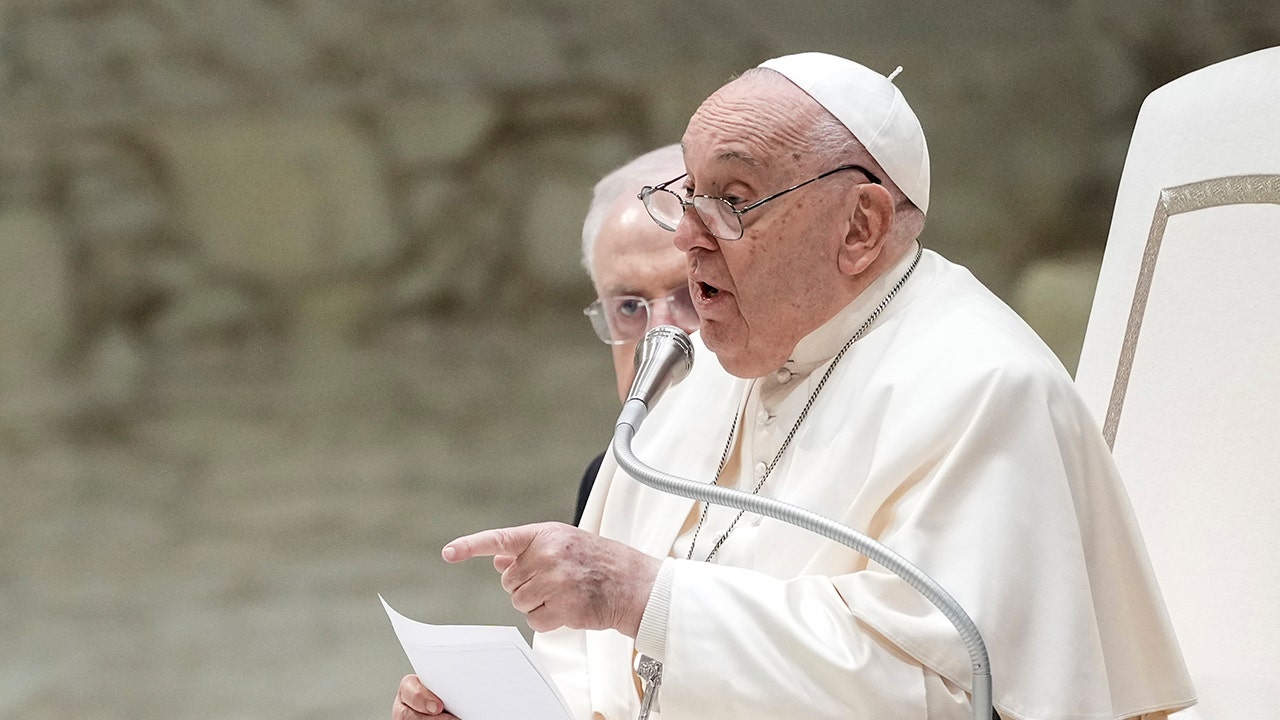
The pope has contracted a cold and will skip his usual outdoor Sunday prayer, instead giving the blessing indoors just days ahead of his Christmas Eve and Day Masses, the Vatican said Saturday.
Chilly weather and the pope’s busy schedule during Christmas week were cited as reasons for the 88-year-old giving the blessing from his residence at the chapel of the Vatican’s Santa Marta quarters.
The pope usually addresses the public from the window of St. Peter’s Basilica overlooking St. Peter’s Square on Sundays.
BIDEN HEADING TO VATICAN CITY NEXT MONTH TO MEET WITH POPE FRANCIS, MELONI IN FINAL OVERSEAS TRIP
Pope Francis exchanges the season’s greetings with Vatican employees on Saturday. (AP Photo/Andrew Medichini)
Pope Francis sounded congested on Saturday as he gave his annual Christmas greeting to Vatican bureaucrats.
The octogenarian has suffered from bronchitis before, including last year when he was hospitalized, and he also missed a climate change meeting in Dubai last year because of the flu and lung inflammation.

The pope has contracted a cold and will skip his usual outdoor Sunday prayer, instead giving the blessing indoors just days ahead of his Christmas Eve and Day Masses, the Vatican said Saturday. (AP Photo/Andrew Medichini)
POPE FRANCIS REVEALS HE WAS NEARLY ASSASSINATED DURING HISTORIC IRAQ TRIP
The pope developed pleurisy in his 20s and was forced to have part of his lungs removed in his native Argentina.
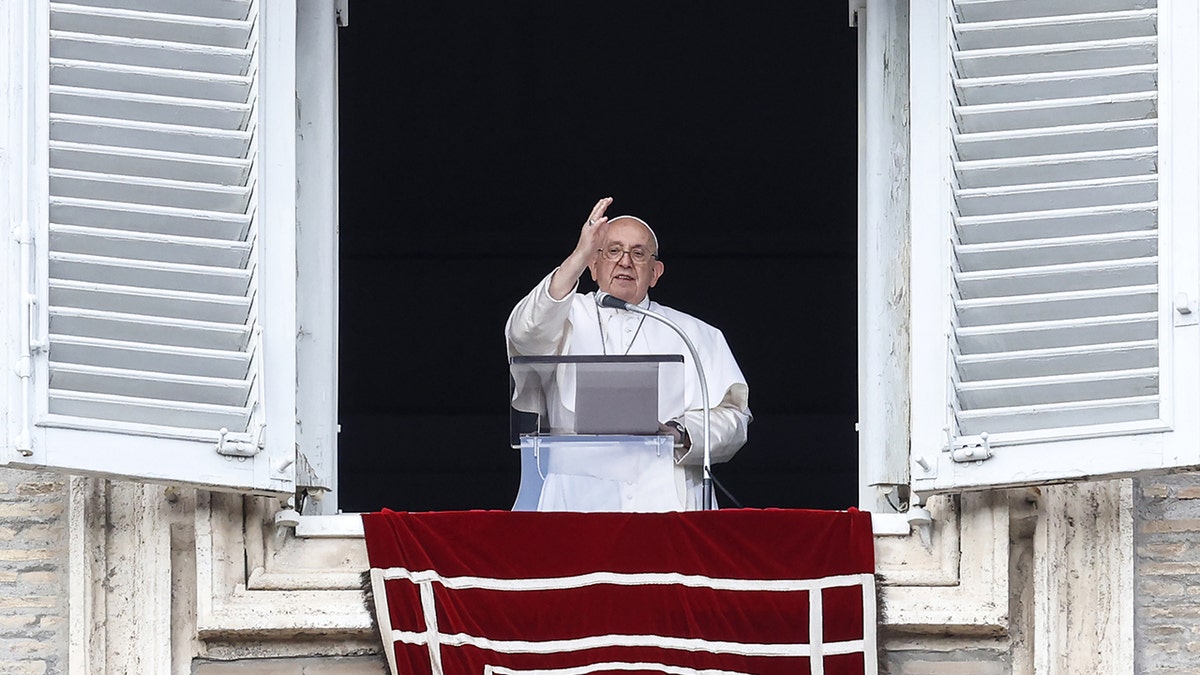
The pope usually addresses the public from a window of St. Peter’s Basilica overlooking St. Peter’s Square on Sundays. (Riccardo De Luca/Anadolu via Getty Images)
Christmas Eve also marks the beginning of the Vatican’s Holy Year in which around 32 million pilgrims are expected to head to Rome throughout 2025.
The pope will open the Holy Door of St. Peter’s Basilica on Christmas Eve and On Dec. 26, he will go to Rome’s main prison to inaugurate the start of the Holy Year there.
The Holy Year, also known as the Jubilee, is usually held every 25 years.
The Associated Press and Reuters contributed to this report.
-

 Politics1 week ago
Politics1 week agoCanadian premier threatens to cut off energy imports to US if Trump imposes tariff on country
-
/cdn.vox-cdn.com/uploads/chorus_asset/file/25782636/247422_ChatGPT_anniversary_CVirginia.jpg)
/cdn.vox-cdn.com/uploads/chorus_asset/file/25782636/247422_ChatGPT_anniversary_CVirginia.jpg) Technology1 week ago
Technology1 week agoInside the launch — and future — of ChatGPT
-
/cdn.vox-cdn.com/uploads/chorus_asset/file/25789444/1258459915.jpg)
/cdn.vox-cdn.com/uploads/chorus_asset/file/25789444/1258459915.jpg) Technology1 week ago
Technology1 week agoOpenAI cofounder Ilya Sutskever says the way AI is built is about to change
-

 Politics1 week ago
Politics1 week agoU.S. Supreme Court will decide if oil industry may sue to block California's zero-emissions goal
-
/cdn.vox-cdn.com/uploads/chorus_asset/file/25546252/STK169_Mark_Zuckerburg_CVIRGINIA_D.jpg)
/cdn.vox-cdn.com/uploads/chorus_asset/file/25546252/STK169_Mark_Zuckerburg_CVIRGINIA_D.jpg) Technology1 week ago
Technology1 week agoMeta asks the US government to block OpenAI’s switch to a for-profit
-

 Politics1 week ago
Politics1 week agoConservative group debuts major ad buy in key senators' states as 'soft appeal' for Hegseth, Gabbard, Patel
-

 Business7 days ago
Business7 days agoFreddie Freeman's World Series walk-off grand slam baseball sells at auction for $1.56 million
-
/cdn.vox-cdn.com/uploads/chorus_asset/file/23951353/STK043_VRG_Illo_N_Barclay_3_Meta.jpg)
/cdn.vox-cdn.com/uploads/chorus_asset/file/23951353/STK043_VRG_Illo_N_Barclay_3_Meta.jpg) Technology6 days ago
Technology6 days agoMeta’s Instagram boss: who posted something matters more in the AI age





